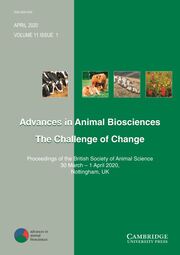Article contents
Life cycle assessment of animal origin products
Published online by Cambridge University Press: 19 October 2016
Abstract
Greenhouse gas emissions from livestock production have a major impact on the environment. Life cycle assessment (LCA) is an accepted method to assess those environmental impacts associated with all stages of products life from cradle to grave, and is used to determine the carbon footprint (CF) of animal origin products. CF is just an environmental indicator to assess sustainability of livestock products, such as milk, beef, pork, chicken, eggs, etc. and is used on products packaging as a so-called carbon label to inform supply chain professionals about the relative impacts of different products and activities. From the published studies who assessed the impact of production of milk, beef, lamb, pork, chicken and eggs using LCA, it is concluded that production of 1 kg of beef used most land and energy and had highest global warming potential, followed by production of 1 kg of lamb, pork, chicken, eggs and milk. However, it should be pointed out that LCA results for livestock products do not include environmental consequences of competition for land between humans and animals, and consequences of land-use changes.
- Type
- Full Paper
- Information
- Advances in Animal Biosciences , Volume 7 , Special Issue 2: Proceedings of the EAAP-European Federation of Animal Science in association with ALPA , October 2016 , pp. 191 - 195
- Copyright
- © The Animal Consortium 2016
References
- 6
- Cited by


